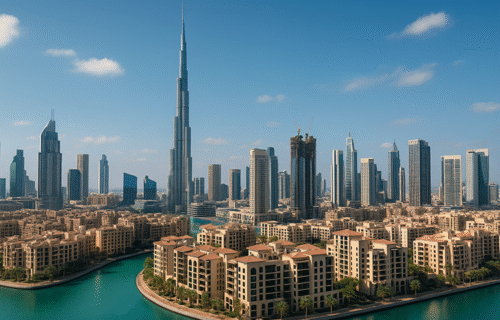Dubai’s property market is entering a more balanced phase after several years of rapid expansion. Analysts expect growth to remain solid through 2027, even as new supply begins to catch up with the city’s strong population growth and investor appetite. For many European buyers — including those from Poland, the Czech Republic, and Slovakia — this new stage of maturity also brings greater clarity and confidence when it comes to selling and repatriating investment capital abroad.
Sales of newly launched developments continue to drive Dubai’s housing sector in 2025. Off-plan transactions have climbed sharply, while demand for completed properties has steadied. Prices for new projects are still rising, but more slowly than in previous years, suggesting that Dubai’s residential cycle is shifting from a surge to a sustainable rhythm. Population growth remains one of the city’s most powerful market engines. Dubai’s resident base expanded by nearly 6 percent in 2024, and the government’s investor-friendly visa programs continue to draw professionals, entrepreneurs, and high-net-worth individuals. Initiatives such as the first-home buyer program are also steering the market toward genuine end-user ownership rather than speculative trading.
Developers are now delivering a large pipeline of apartments and villas through 2027. While this may cap price acceleration, most analysts expect the new units to be absorbed steadily, with the villa segment still under-supplied due to high demand for family and lifestyle-oriented housing. The luxury and branded residence segment continues to lead in value and global visibility. International hotel and fashion brands have deepened their partnerships with Dubai’s major developers, helping to solidify the city’s reputation as a preferred global address for wealthy investors and second-home buyers.
Policy innovation remains a major strength of Dubai’s real estate ecosystem. The ten-year “golden” residency visa tied to property investment continues to attract long-term investors, while the digital Real Estate Tokenization Project opens opportunities for smaller investors to participate through fractional ownership. Together, these measures broaden access, deepen liquidity, and enhance transparency. Developers are also adapting to the changing environment by offering flexible payment plans and more compact, affordable units tailored to young professionals. Despite heavy construction, most large firms, including Emaar, Damac, and Omniyat, maintain strong balance sheets and high levels of pre-sales, underscoring their financial resilience.
A persistent misconception among some foreign investors is that money from a Dubai property sale cannot be taken out of the UAE. This is false. The UAE has no capital-transfer or foreign-exchange restrictions on foreign investors, and funds can be freely remitted abroad once the correct process is followed. The key procedural update in 2025 concerns how funds are received. Under new Dubai Land Department (DLD) regulations, sale proceeds must be paid into a UAE bank account held in the seller’s own name. Third-party payments and Power of Attorney transfers are no longer permitted. After the proceeds are credited, sellers can transfer the money internationally via standard banking channels to any foreign account. The change is part of broader anti–money-laundering safeguards, not a limitation on capital movement. With proper documentation — such as the sale contract, title deed, and DLD transfer receipt — the process is straightforward and compliant with international standards.
For Central European sellers, the process of repatriating funds remains practical and transparent. Polish residents can freely receive proceeds from the UAE, as Poland imposes no currency or transfer restrictions. Gains from property held for five full calendar years after purchase are exempt from capital gains tax, while shorter holdings are taxable and must be declared on the PIT-38 form. Czech residents can also transfer proceeds home without limitation. Property owned for more than five years, or occupied as a main residence for at least two years, qualifies for tax exemption, while shorter ownerships are taxed at 15 or 23 percent depending on income. Slovak owners enjoy similar treatment. Property gains are exempt after five years of ownership; if sold earlier, gains are taxed at 19 or 25 percent, plus a small health levy. In all three countries, banks may request documentation confirming the legitimacy of the sale, such as the title deed, sale receipt, and SWIFT confirmation, as part of standard anti–money-laundering checks.
In practical terms, sellers should ensure that they maintain a UAE bank account in their name before the sale, collect all DLD-issued documents including the title deed and transfer receipt, and request a “purpose of transfer” note from their bank specifying that the funds are property-sale proceeds. Declaring the transaction in the home-country tax return, even when exempt, is also recommended. Keeping records such as SWIFT confirmations and currency-conversion slips provides transparency and simplifies later verification by local authorities.
Dubai’s approach to property regulation — balancing open investment with responsible oversight — has helped it become one of the most transparent and globally connected real estate markets in the world. Investors from across Europe continue to view the emirate as both a safe haven and a profitable long-term destination. Looking ahead, Dubai’s housing sector appears poised for steady growth rather than speculative spikes. Population expansion, innovative ownership models, and investor-friendly policies should sustain demand through the next decade.
For Central European owners, the message is reassuring: selling property in Dubai and repatriating the proceeds abroad remains fully permitted, practical, and protected. There are no legal barriers to moving funds out of the UAE, only procedural checks to ensure compliance. Once completed, the proceeds can be safely transferred to Poland, the Czech Republic, or Slovakia, where only local capital-gains tax rules may apply.
In short, Dubai’s housing market is maturing into a phase of sustainable growth, supported by strong fundamentals and transparent rules. For investors from Central Europe, it remains one of the few global destinations offering both high real estate returns and full freedom to repatriate gains securely.
Sources: S&P Global, UAE Central Bank, OECD/EU and CIJ.World analysis.
